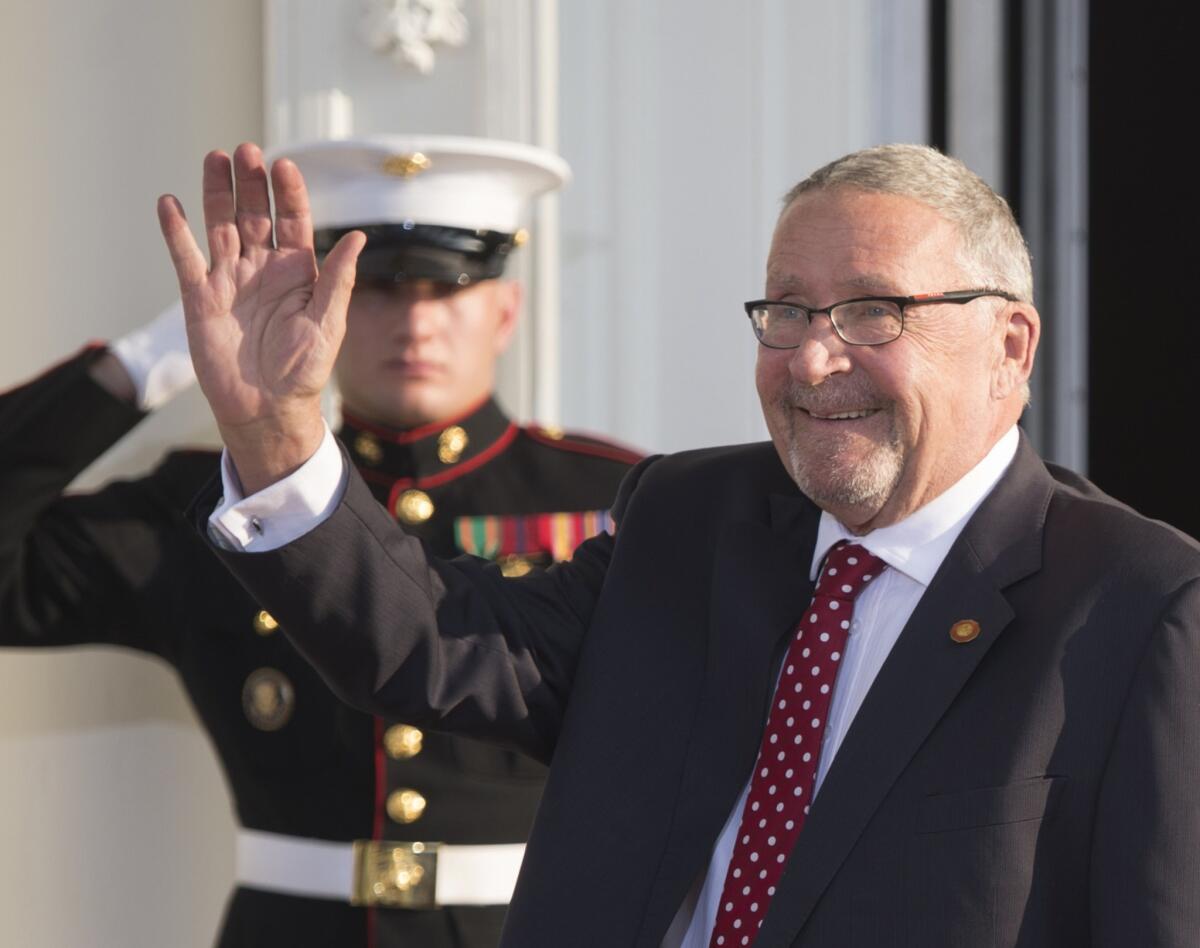Guy Scott of Zambia now sub-Saharan Africa’s only white head of state

- Share via
Reporting from Johannesburg, South Africa — Guy Scott, famous in Zambia for his jocular, outspoken — and sometimes undiplomatic — tongue, on Wednesday became the nation’s acting president and sub-Saharan Africa’s only current white head of state.
Scott took office in the southern African copper-producing nation after the death of President Michael Sata in London late Tuesday, amid questions about whether Scott can run for the office in coming elections. The announcement came after a Cabinet meeting lasting several hours.
------------
FOR THE RECORD
Oct. 29, 9:45 a.m.: An earlier version of this post stated that Scott was elected vice president in 2011. He was appointed.
------------
Sata had appointed Defense Minister Edgar Lungu as acting president before departing for medical treatment in Britain. Sata’s Patriotic Front, reportedly in chaos, has been jostling over the question of succession while the president was sidelined by poor health.
But under Section 38 of the Zambian Constitution, the vice president becomes acting president upon the death of the president, and it calls for an election to choose the new leader within 90 days.
The constitution also says a president must be born of Zambian parents. Scott was born in the southern city of Livingstone when the country was still Northern Rhodesia, the son of a Scotsman, Alec Scott, who entered politics and opposed colonial rule, and an Englishwoman.
In previous rulings on the question of presidential parentage, the Supreme Court found that people who lived in Northern Rhodesia and became citizens when the country gained independence from Britain were eligible to be president because there was no Zambia their parents could have been from before 1964. However, Scott himself has cast doubt on his eligibility to run for the presidency several times in the past.
Scott, 70, who was appointed vice president in 2011, has been at times controversial in the post. He angered the regional powerhouse, South Africa, which last year summoned the Zambian ambassador to explain remarks the vice president made in a newspaper interview. Scott had said he pitied the advisors of South African President Jacob Zuma and “hated” South Africans who were “backward.”
Last year, Scott said in an interview with the Guardian that black South African leaders behaved like their white predecessors and compared Zuma with the last white South African president, Frederik W. de Klerk, who lost office when Nelson Mandela’s African National Congress swept to power in 1994.
“The South Africans are very backward in terms of historical development. I hate South Africans. That’s not a fair thing to say because I like a lot of South Africans, but they really think they’re the bees’ knees and actually they’ve been the cause of so much trouble in this part of the world.
“I have a suspicion the blacks model themselves on the whites now that they’re in power. ‘Don’t you know who we are, man?’”
The departure of De Klerk marked the last time a white man was the head of state in sub-Saharan Africa until Wednesday.
In the 2013 interview, Scott joked about the banter between him and fellow Patriotic Front member Sata over the fact Scott is white: “He says things like, ‘What would you be if you weren’t white?’ I said, ‘The president?’ That shut him up.”
In 2012, Scott told the Spectator that former President George W. Bush “thought they were kidding” when Scott was introduced to him as vice president.
When Sata appointed him in 2011, Scott said there had been no hint of resentment at a white man becoming vice president.
Sata, widely known as “King Cobra,” died in a London hospital with his family at his side. There was anger in Zambia that the government concealed his still-unidentified illness after a statement last week that he was going abroad for a “medical checkup.”
Sata, rarely seen in public since May, missed a speech at the United Nations last month and the country’s 50-year independence celebrations last week.
Lungu, the defense minister, is seen as front-runner to be the Patriotic Front’s presidential candidate, with other probable rivals including Finance Minister Alexander Chikwanda and former Justice Minister Wynter Kabimba, sacked by Sata in August.
Sata came from a humble background and had a modest education. He swept railway stations in Britain before becoming a train driver, and later trained as a pilot in Russia.
He was a populist who served in several governments as a minister and swapped parties several times before finally becoming president in 2011, after campaigning aggressively against Chinese exploitation of Zambian mineworkers and appealing to the poor and unemployed.
Scott, also popular in Zambia, is a Cambridge University economics graduate who went on to study robotics at Oxford University. He served as a minister in several governments, including as agricultural minister during a severe drought in 1991-92.
Two opposition parties, the Movement for Multiparty Democracy, which governed for 20 years until 2011, and the United Party for National Development, will probably field candidates in the election.
Sata was the second Zambian president in recent years to die in office in a foreign hospital. Levy Mwanawasa died in a Paris hospital in 2008 after suffering several strokes.
Follow @robyndixon_LAT on Twitter for news out of Africa.
More to Read
Sign up for Essential California
The most important California stories and recommendations in your inbox every morning.
You may occasionally receive promotional content from the Los Angeles Times.













